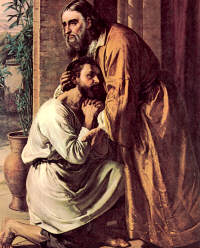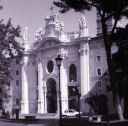
Daily Readings for: March 10, 2013
(Readings on USCCB website)
Collect: O God, who through your Word reconcile the human race to yourself in a wonderful way, grant, we pray, that with prompt devotion and eager faith the Christian people may hasten toward the solemn celebrations to come. Through our Lord Jesus Christ, your Son, who lives and reigns with you in the unity of the Holy Spirit, one God, for ever and ever.
Lent: March 10th
Fourth Sunday of Lent
Old Calendar: Laetare Sunday
"Rejoice, Jerusalem! Be glad for her, you who love her; rejoice with her, you who mourned for her, and you will find contentment at her consoling breasts." This Sunday is known as Laetare Sunday and is a Sunday of joy. Lent is half over, and Easter is enticingly near.
This Sunday was formerly called "Laetare Sunday" since its mood and theme was one of hope and rejoicing that Easter was near. In the reformed calendar this Sunday is not different from the other Sundays of Lent even though the entrance antiphon for the day still begins with the Latin word "laetare" and the vestments worn by the celebrant are rose-colored, not violet. The day is important because it is the day of the second scrutiny in preparation for the baptism of adults at the Easter Vigil.
Click here for commentary on the readings in the Extraordinary Form of the Roman Rite.
Stational Church
Sunday Readings
The first reading is taken from the book of Joshua, 5:9, 10-12. Today's reading recounts the celebration of the Passover in the Promised Land by Joshua and those who had sojourned with him in the desert for 40 years.
The second reading is from the second letter of Paul to the Corinthians, 5: 17-21. The reconciliation of mankind with God has been brought about by Christ's death on the cross. Jesus, who is like men in all things "yet without sinning" bore the sins of men and offered himself on the cross as an atoning sacrifice for all those sins, thereby reconciling men to God; through this sacrifice we became the righteousness of God.
The Gospel is from St. Luke 15:1-3, 11-32. This reading recounts the parable of the Prodigal Son, one of Jesus' most beautiful parables. It teaches us once more that God is a kind and understanding Father. The son who asks for his part of the inheritance is a symbol of the person who cuts himself off from God through sin. "Although the word 'mercy' does not appear, [this parable] nevertheless expresses the essence of the divine mercy in a particularly clear way" (John Paul II, Dives in misericordia, 5).
Mercy — as Christ has presented it in the parable of the prodigal son — has the interior form of the love that in the New Testament is called agape. This love is able to reach down to every prodigal son, to every human misery, and above all to every form of moral misery, to sin. When this happens, the person who is the object of mercy does not feel humiliated, but rather found again and 'restored to value'. The father first and foremost expresses to him his joy, that he has been 'found again' and that he has 'returned to life'. This joy indicates a good that has remained intact: even if he is a prodigal, a son does not cease to be truly his father's son; it also indicates a good that has been found again, which in the case of the prodigal son was his return to the truth about himself" (Dives in misericordia, 6).

The Station at Rome is in the basilica of Holy Cross in Jerusalem, one of the seven principal churches of the holy city. It was built in the fourth century, by the emperor Constantine. The emperor's mother, St. Helen, enriched it with most precious relics, and wished to make it the Jerusalem of Rome.